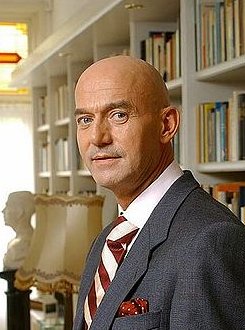Pim Fortuyn
| Pim Fortuyn | |
|---|---|

Pim Fortuyn on 4 May 2002, two days before his assassination (Photo: Roy Beusker)
|
|
| Born |
Wilhelmus Simon Petrus Fortuijn 19 February 1948 Driehuis, Netherlands |
| Died | 6 May 2002 (aged 54) Hilversum, Netherlands |
| Cause of death | Assassinated |
| Resting place | San Giorgio della Richinvelda, Italy |
| Residence | Rotterdam, Netherlands |
| Nationality | Dutch |
| Other names | Pim Fortuijn |
| Alma mater |
VU University Amsterdam (Bachelor of Social Science, Master of Social Science) University of Groningen (Doctor of Philosophy) |
| Occupation |
Politician · Civil servant · Sociologist Corporate director · Political consultant · Political pundit · Author · Columnist · Publisher · Teacher · Professor |
| Political party |
Labour Party (1974–1989) People's Party for Freedom and Democracy (mid 1990s) Livable Netherlands (2001–2002) Livable Rotterdam (2001–2002) Pim Fortuyn List (2002) |
Wilhelmus Simon Petrus Fortuijn, known as Pim Fortuyn (Dutch: [ˈpɪm fɔrˈtœyn]; 19 February 1948 – 6 May 2002), was a Dutch politician, civil servant, sociologist, author and professor who formed his own party, Pim Fortuyn List (Lijst Pim Fortuyn or LPF) in 2002.
Fortuyn provoked controversy with his outspoken views about multiculturalism, immigration and Islam in the Netherlands. He called Islam "a backward culture", and was quoted as saying that if it were legally possible, he would close the borders for Muslim immigrants. He was labelled a far-right populist by his opponents and in the media, but he fiercely rejected this label. Fortuyn was openly homosexual.
Fortuyn explicitly distanced himself from "far-right" politicians such as the Belgian Filip Dewinter, the Austrian Jörg Haider, or Frenchman Jean-Marie Le Pen whenever compared to them. While he compared his own politics to centre-right politicians such as Silvio Berlusconi of Italy, he also admired former Dutch Prime Minister Joop den Uyl, a social democrat, and Democratic U.S. president John F. Kennedy. Fortuyn also criticised the Polder model and the policies of the outgoing government of Wim Kok and repeatedly described himself and LPF's ideology as pragmatic and not populistic.
...
Wikipedia
